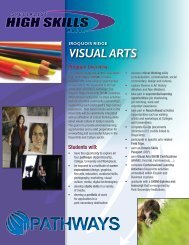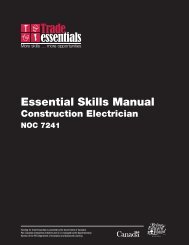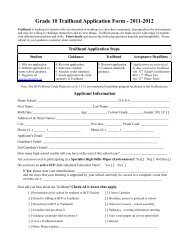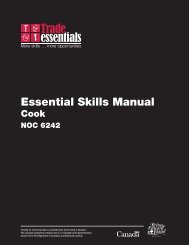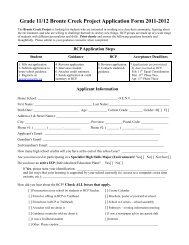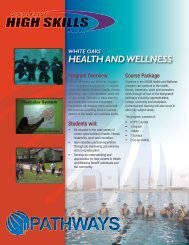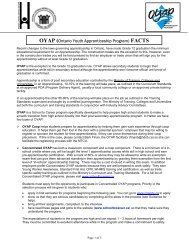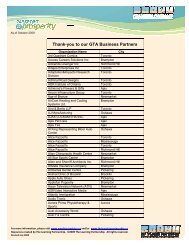PURSUITS 2011! - Business Education Council of Niagara
PURSUITS 2011! - Business Education Council of Niagara
PURSUITS 2011! - Business Education Council of Niagara
Create successful ePaper yourself
Turn your PDF publications into a flip-book with our unique Google optimized e-Paper software.
1) Discover your unique talents and abilities<br />
Everyone is good at something. You have skills<br />
and abilities that are unique to you. And, they are<br />
not all work-related. You may not recognize the<br />
skills you have acquired in some <strong>of</strong> the activities<br />
you take part in every day. Find out what they are.<br />
2) What occupations are out there<br />
There are countless <strong>of</strong> opportunities in <strong>Niagara</strong>.<br />
To make a good decision about your future after<br />
high school, you must find out all you can about the<br />
opportunities are out there. Review the article on<br />
Page 6 that explores a uniques system <strong>of</strong> looking<br />
at jobs from a “creative class.”<br />
3) What education/training will you need<br />
Part <strong>of</strong> career planning involves finding out what<br />
additional education you will need for your chosen<br />
career path. Explore your learning and training<br />
options. Visit <strong>Niagara</strong> College or Brock University<br />
and talk to one <strong>of</strong> their career developers. Or,<br />
perhaps you might consider a skilled trade.<br />
Check out the Ministry <strong>of</strong> Training Colleges and<br />
Universities or www.apprenticesearch.com to see<br />
what education or training is required.<br />
4) How will you pay for your education<br />
Paying for post secondary education can come<br />
from a variety <strong>of</strong> sources. For many students,<br />
savings from summer and part-time jobs and<br />
contributions from parents and others won’t provide<br />
enough money to cover the costs <strong>of</strong> their postsecondary<br />
education. Additional sources <strong>of</strong> funding<br />
can be found in grants, student loans, scholarships,<br />
and other awards. Financing your education,<br />
handling your cash and replaying student loans<br />
should also be considered when planning<br />
your future.<br />
5) What are your next steps<br />
Setting goals is an important part <strong>of</strong> your career<br />
planning process. When you set goals you are able<br />
to measure and chart your progress. You’ll know<br />
where you want to be, how you want to get there,<br />
and how close you are to reaching your goal.<br />
Use the worksheet on Page 37 to simplify your<br />
next steps. Remember, career planning is a<br />
journey and your goals may change throughout<br />
your lifetime.<br />
38




